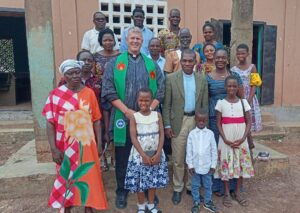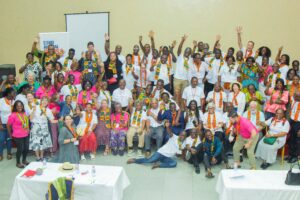
Rev. Joshua Heikkila stands next to the Rev. Samuel Amafu-Dey (Synod Moderator of the Upper Northern Presbytery, Evangelical Presbyterian Church, Ghana) along with congregation members in Yendi, Ghana, in August of 2023.
Mission co-workers have been global partners in the Presbyterian Church since the mid-1850s. Their role of sharing the Gospel and creating a bond while “on the ground” in foreign lands has been invaluable to many presbyteries and congregations back in the United States.
The role of the co-workers has shifted in 2025. In January, it was announced that the PC(USA) was reworking its global engagement plan. The denomination cut funding for the 60-plus mission co-workers it supports in places like Africa, Asia, Europe and Central America, in turn offering new positions to a portion of them. The news came as a shock to the co-workers, most of whom have been pulled out of their countries and are left with finding new ways to serve.
The cuts do not affect the partnerships many presbyteries have with different countries around the world. The change will, however, affect how those presbyteries communicate and coordinate with those parts of the globe, potentially creating some difficult hurdles to climb going forward.
Donna Cammarata is the convener for the Ghana Mission Network and a member of the Presbytery of Lake Erie, which has a partnership with a sister presbytery in northern Ghana. Her ability to act as a human catalyst with Lake Erie’s African sisters and brothers is being hampered by the denomination’s cutbacks, and she’s not alone.
“It’s an incredible loss,” Donna said of the PC(USA)’s mission co-worker cuts. “It’s such a loss, and I think that it’s going to be very difficult for partnerships to make up that loss.”
In Africa alone, there had been 18 mission co-workers assigned to serving in various countries. Currently, there is just one GEL (Global Ecumenical Liaison) who will oversee all of Africa, with a second in the process of being selected.
“All those mission co-workers, and many of them had been there decades, their positions have been eliminated,” Donna said. “And now the GEL is the PC(USA) connection to Africa’s global partners.”
Donna started hearing rumblings that the PC(USA) was looking to make changes to its mission co-worker structure about a year ago.
“That’s when I started realizing there may be a threat to our mission co-worker’s position,” she said. “That’s when I became even more aware and more concerned.”
Not too long after, mission co-worker Josh Heikkila, who had been serving in Ghana since 2009, called Donna and told him his position had been cut.
“The Ghana Mission Network has ties with Josh Heikkila, who also served as the West Africa Area Regional Liaison,” Donna explained. “So, he was engaged in five different countries, but he lived in Ghana. He was the main connector and always actively involved in the Mission Network. He helped to initiate our Lake Erie Ghana Partnership, and facilitated and supported many partnerships within the Ghana Mission Network.
“Josh was that key relational piece. He helped facilitate the various partnerships and mission collaborations. He would visit our partners in the North and then be able to make that connection. He was a key connector piece.”
Donna described Josh’s work in Africa as a “cultural interpreter,” meaning someone who has learned the language and culture and can be a translator between two partnering organizations so that they can bond.
“They help us understand one another,” Donna described. “They’re a network person who helps us connect with leadership and other key folks in-country that we can build relationships with. They’re a facilitator. For example, when we took trips over there, Josh helped organize a lot of the logistics and helped us to engage with people in experiences together.
“The other part of what he (Josh) did was he would come to the U.S. and visit the U.S. partners and share what was happening in Ghana. It was some interpretation stuff and helped build relationships and make that connection with our global partners more real. I think that’s the key thing that was lost is that personal connection.
“The cultural education is so important. It helped us to have healthy, equitable relationships, and I think that’s missing. There’s a big hole that has been left, and I don’t know how that hole’s going to get filled.”
What direction congregations and presbyteries go with partnerships in foreign countries remains to be seen.
“What is next? We’re trying to figure that out,” Donna said.

Attendees gather at the PC(USA) Ghana Mission Network Annual Conference in October of 2024 in Tema, Ghana.
Donna and Josh have spoken about continuing the important relationship Josh has with Ghana and its Presbyterian partners in the States. One plan is for the entire Ghana Mission Network to continue to support Josh in ways that he can continue to be that bridge between the U.S. and Ghana.
“He would very much like to stay in Ghana, he would like to continue, but he has a bunch of other ideas,” Donna said. “We’ve talked about what kind of position could be formed that he could spend time here developing educational cultural trips. There are possibilities of creating a position for him.”
The Presbytery of Lake Erie’s main role in the Ghana Mission Network has been to hold the funds that are used for conferences and other related expenses. The presbytery plans to continue to be that “bank” of sorts going forward.
“Josh has also garnered a whole lot of support in the Ghana Mission Network for his salary and his (benefits) package,” Donna continued. “He has a tremendous amount of supporters who continue to want to support him.”
For now, the plan is a short-term commitment, maybe a couple of years, so that things can be created and ironed out under this new way of service.
“I’m excited about the new possibilities,” Donna said. “I’m certainly deeply grieving over the losses. My heart’s broken for the mission co-workers and for our global partners and the mission networks. It’s a ripping out of a loved one.”
Despite the drastic change, Donna sees some positive things sprouting in this new structure.
“I see it as a way for congregations and presbyteries to take more ownership of global missions to become more informed and more engaged,” she said. “I think that’s an exciting part of it.”
Donna believes the PC(USA) still has an important role to play under the current format.
“They have been a key partner I feel like that is also still an open door,” she said of the denomination. “I feel that we can figure this out together and partner together. They have resources and something to bring to the table also. I don’t know how that’s gonna work out or what it’s gonna look like but let’s bring everybody to the table and have conversations.”
Donna admitted that the denomination’s vagueness regarding its decision to cut funding to the mission co-workers was upsetting.
“One of the frustrations is we have not been reached out to from PC(USA),” Donna said. “We were not consulted or had any conversations before this decision happened and very little since. I feel like networks are an invisible partnership that PC(USA) didn’t really recognize the role that mission networks play and the tremendous importance of the mission co-workers to the networks.
“There’s tremendous grief and anger because of the way it happened and the lack of communication and transparency. There’s a lot of hurt that’s out there.”
The New Wilmington Mission Conference at Westminster College in New Wilmington, PA, in July allowed these feelings of sorrow and anger to be shared openly among those who attended.
“Part of our gathering at New Wilmington was that lament,” Donna said. “But we’re not going to stay here because there is hope. God is not dead. Mission is not dead. Our relationships are not dead.”
Donna knows there will be an adjustment period under this new format until things are running smoothly again, but she is encouraged by the possibilities of what this updated structure will look like and the fruits it can bear.
“I see tremendous hope,” she said. “As I’m gathering more with mission network conveners and mission co-workers, the hope that they have is inspiring. This community has connected more. I have been totally focused on the Ghana Mission Network. Through these last 6-7 months, I’ve connected with so many other networks and so many other mission co-workers and am seeing what God is doing around the world and what will continue.
“I do have hope and some excitement that something new is bubbling up. There’s this community that’s coming together. There’s movement forward and an enlargement. That’s exciting.
“We need to be in prayer. I think this is bigger than all of us. It feels like all the tables have been turned over and we don’t know what to do next. There’s assurance that God has a plan. God’s at work. We need to tap into that, to be discerning, to be in prayer, to wait for the leading of the Holy Spirit. It’s God’s mission, and I think this drawing us together gives us a bigger picture of what God’s doing around the world and here at home.
“I’m confident that we are in this together, and if we walk together and continue to align ourselves with the movement of God’s spirit some exciting things will happen.”
